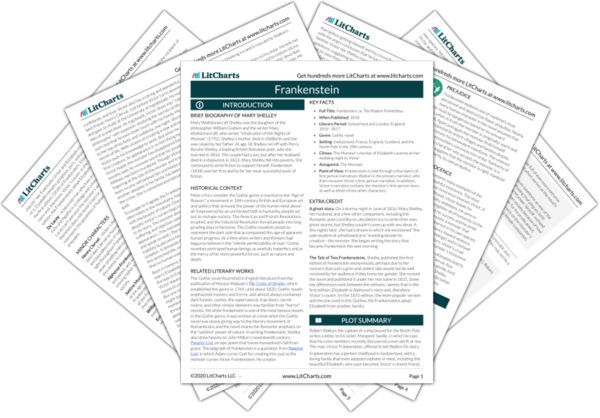Summary
Analysis
The novel returns to the frame of Walton's letters to his sister, Margaret Saville. In a letter on August 26, Walton says that he believes Victor's story and recalls how Victor described himself as the victim of "lofty ambition," which brought him to despair. Walton laments that he did not know Victor when they could have been friends. As Walton writes, "I have sought one who would sympathize with and love me." Yet while Victor responded kindly to his offers of friendship, he remained fixated on his only remaining destiny: to destroy the monster.
Walton and Victor are after the same thing: love, acceptance, and glory. And in both cases, their ambition worked against their hope for love and acceptance. Both men end up trapped and isolated, Walton by nature and Victor by the need for vengeance.
Themes
Quiz
Test Yourself
In a letter on September 2, Walton tells Margaret that his ship and crew are in grave danger: the ship is now surrounded entirely by ice. He blames himself for their fate and says they may all die as a result of his "mad schemes." He fears a mutiny.
Just as Victor lost his innocence and realized the dangers of his ambition, so too does Walton. Walton also fears vengeance from the "monster" of his crew.
Themes
Quiz
Test Yourself
In a letter on September 5, Walton says that his crew have demanded that he turn the ship around and head for home as soon as the ice frees them. Victor speaks up in his defense, telling the rebellious crew members they should "be men," for they had set out to be the "benefactors of [their] species." The speech changes the crew's mind, but Walton fears only temporarily. He says he'd rather die than return in shame with his "purpose unfulfilled."
Walton maintains the innocent ideal notion that he can somehow enlighten all of humankind by seeing the North Pole. The same mix of arrogance, benevolence, and lust for fame fuels both his and Victor's ambitions. Victor's speech implies that he has not, in fact, changed much at all.
Themes
Quiz
Test Yourself
In a letter on September 7, Walton says he has agreed to the crew's demand to turn back. He considers what has happened an injustice.
Like Victor, Walton blames his failure not on his ambition or his fallibility, but on others.
Themes
Quiz
Test Yourself
Get the entire Frankenstein LitChart as a printable PDF.

In his final letter on September 12th, Walton says that he has turned back, his hopes of "glory" and "utility" crushed. In addition, Victor has died. Victor had objected to Walton's decision to turn back his ship and said that his own "purpose" remained firm. Victor then tried to rise and return to the ice, but could not. He reaffirmed his certainty that he acted well in trying to defend his fellow man against the monster, his creation. He then died quietly, eager to rejoin the relatives he had lost in life.
Like Victor, Walton's ambition destroys everything around him until he's left alone. Victor, quick to judge everything but himself, expects Walton to stick to his convictions, but his own conviction is a need for revenge. If he had truly acted in "good faith," he would have confronted his prejudice, or, failing that, told his secret earlier.
Themes
Quiz
Test Yourself
Walton interrupts his letter upon hearing a disturbance in the cabin where Victor's body lies. He returns to tell Margaret that he has just seen the monster crying over Victor's corpse. To Walton's shock, the monster says he suffered remorse and pity for Victor all along. Walton calls the monster a "wretch." The monster is unsurprised, having been rejected by people from the start. It says that it abhorred itself even as it was doing evil, and describes itself as a "fallen angel," yet it also wonders why only it, and not Felix, or the man who shot it, or Frankenstein, is considered a "criminal." The monster then promises to end its own life, springs from the cabin back onto the ice, and disappears.
The last person the monster encounters before killing itself treats it unfairly, with the same prejudice and bitterness the monster faced throughout its life. The monster's use of religious language to describe its plight again suggests the connection between Frankenstein and Paradise Lost, and between the monster, Adam, and Satan. With a final condemnation of the prejudice it has always faced and the weakness of men, the monster reveals its final loss of innocence: its own self-hatred, and wish to die.
Themes
Quiz
Test Yourself












